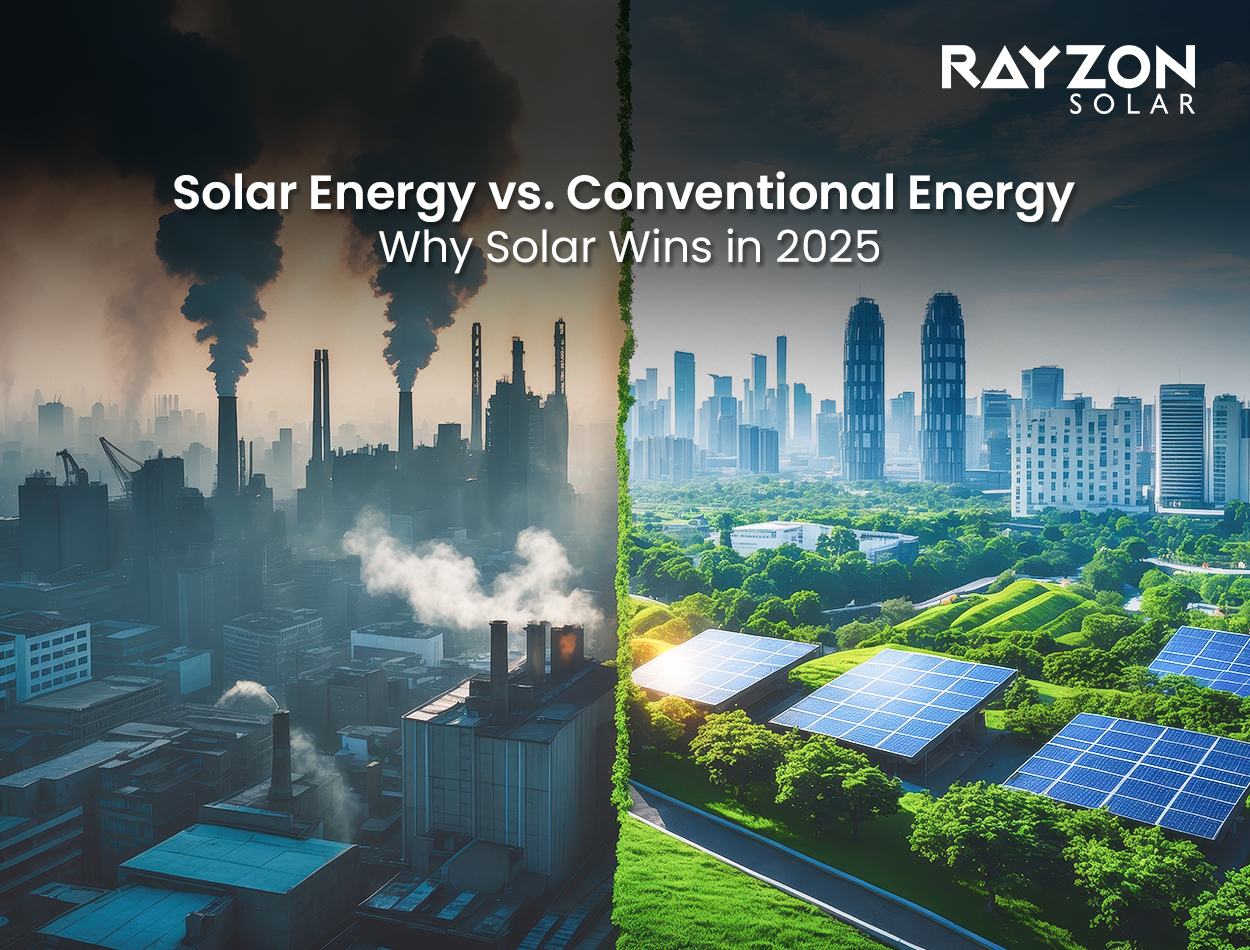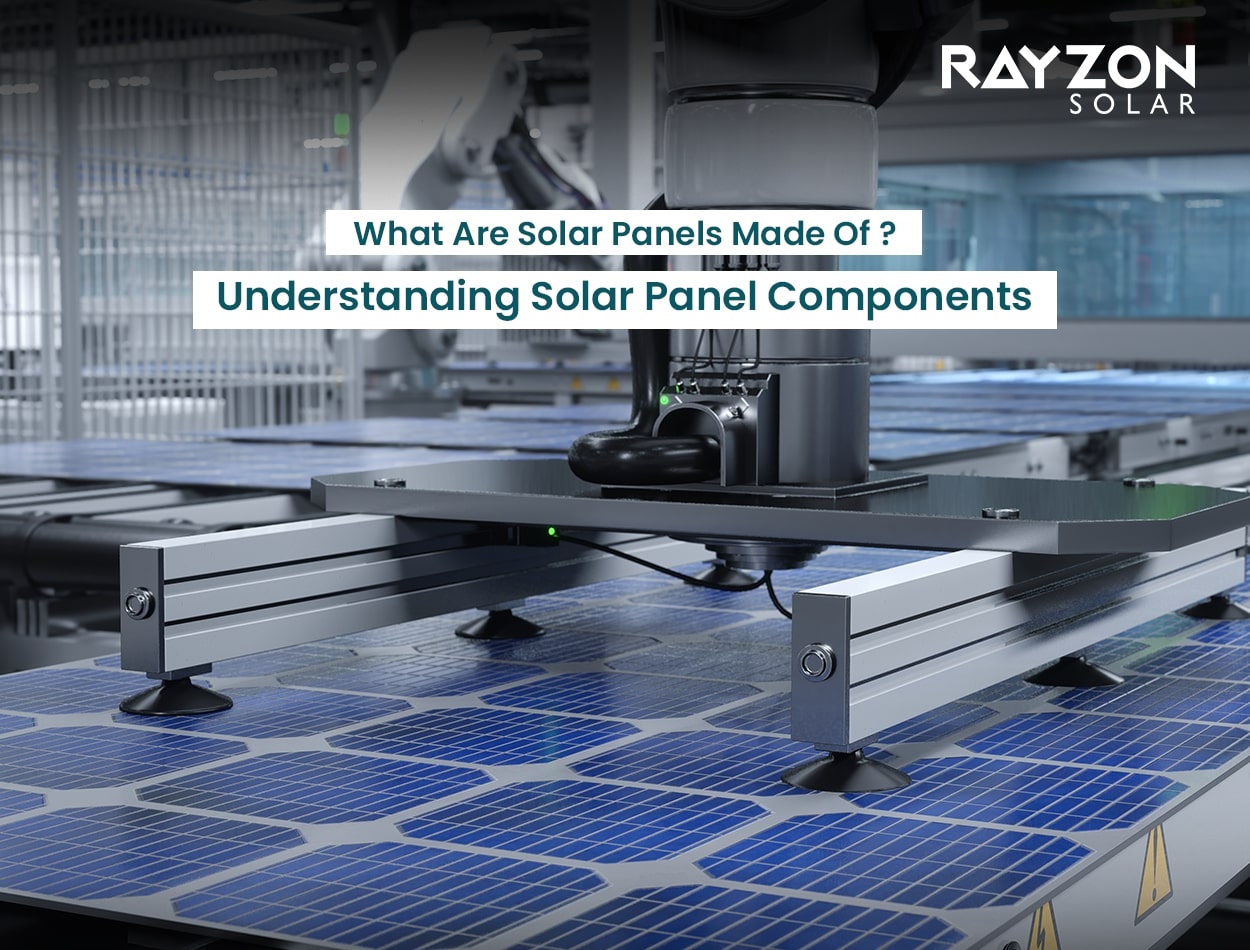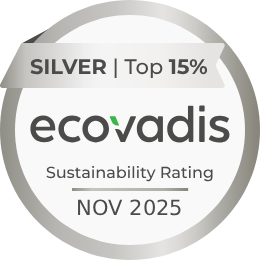
Solar Energy vs. Conventional Energy: Why Solar Wins in 2025
The global energy landscape in 2025 is undergoing a massive transformation. Solar vs conventional energy is no longer just a debate but a critical choice shaping a sustainable and cost-effective future. With fossil fuels becoming costlier and environmentally harmful, solar energy has emerged as the clear winner due to its affordability, eco-friendliness, and technological advancements.
In this blog, we explore the benefits of solar energy in 2025, comparing renewable energy vs fossil fuels, and why businesses and households are making the switch. We'll also highlight the cost of solar vs electricity, long-term savings, and the future of renewable energy.
Understanding Solar vs Conventional Energy
Conventional energy, derived from fossil fuels such as coal, oil, and natural gas, has been the backbone of global power generation for decades. However, these sources are finite, non-renewable, and significant contributors to global warming. Their fluctuating prices and rising demand have further burdened consumers and industries.
On the other hand, solar energy is renewable, abundant, and increasingly affordable. With the clean energy advantages of zero emissions and minimal maintenance, solar power is emerging as a viable solution for both residential and industrial users. Green energy vs traditional power is tipping in favour of solar in 2025.
Solar Energy Benefits 2025: A Game Changer
The benefits of solar energy in 2025 go far beyond just cost savings. Solar technology has reached grid parity, meaning the cost of producing solar electricity is now equal to or less than conventional electricity in many regions. This shift makes solar an attractive investment for both homes and businesses.
Government policies, net metering benefits, and declining solar panel costs have also made solar energy cost savings a reality. For more insights on maximising solar performance, check our blog: Maximizing Solar Panel Efficiency – Expert Tips.
Why Choose Solar Energy Over Fossil Fuels?
Switching from fossil fuels to solar energy is not just a trend but a necessity for sustainability. Fossil fuel plants emit harmful greenhouse gases like carbon dioxide, which worsen climate change. Solar energy, being clean and renewable, eliminates such risks while promoting environmental protection.
Moreover, the cost of solar vs electricity strongly favours solar energy due to lower operational costs and zero fuel dependency. Over time, businesses using solar energy for industries enjoy increased profits as they save on massive electricity bills.
Green Energy vs Traditional Power
Traditional power plants require continuous fuel extraction and transportation, adding to environmental degradation. In contrast, solar panels harness energy directly from the sun, reducing the need for resource-intensive processes. The result is cleaner air and reduced dependence on imported fuels.
Green energy vs traditional power also creates economic benefits, with renewable energy projects creating more jobs than fossil fuel industries. Many companies are investing in solar to align with corporate sustainability goals and enhance their brand image.
Solar Energy for Industries
Large-scale industries have high energy demands, which make solar energy for industries an attractive option. By installing rooftop or ground-mounted solar systems, industries can slash power expenses and gain energy independence, even during peak demand times.
Industrial adoption of solar also contributes to future of renewable energy initiatives. Many industries are now integrating solar-powered operations with energy storage systems to ensure continuous operations, even when sunlight is unavailable.
Cost of Solar vs Electricity: Breaking the Myth
One of the biggest myths about solar energy is its cost. While solar installation requires upfront investment, the falling prices of solar panels and government subsidies have made solar energy highly affordable. The cost of solar vs electricity over a 20-year span is significantly lower.
After the payback period, solar panels generate electricity at almost no cost. For homeowners, this means solar energy cost savings every month. Check our guide on reducing bills: Reduce Your Electricity Bill with Solar.
The Future of Renewable Energy in 2025
The future of renewable energy is brighter than ever. Countries like India are aiming for 500 GW of renewable energy capacity by 2030, with solar playing a dominant role. With energy storage and smart grids, solar energy is becoming a 24/7 power solution.
Solar energy is also driving electric vehicle (EV) charging infrastructure, reshaping transportation. Learn how solar is revolutionizing homes: Revolutionizing Your Home with Solar Energy.
Clean Energy Advantages for Homes and Businesses
Clean energy advantages include improved health outcomes due to reduced air pollution, increased property value, and long-term savings. Rooftop solar panels are becoming a standard for new construction projects across residential and commercial properties.
Additionally, industries adopting solar not only save money but also contribute to corporate social responsibility goals, attracting environmentally conscious customers and investors.
Green Energy vs Traditional Power: Global Impact
Globally, the shift to solar energy is reducing carbon emissions and slowing climate change. Countries that once relied on coal-based electricity are now investing heavily in renewable energy vs fossil fuels as part of their climate commitments.
India, in particular, has become a hub for solar innovation, with companies like Rayzon Solar leading the way. Learn more about India's Renewable Energy Expansion.
Why Solar Wins in 2025
The solar revolution is not just about technology but about financial and environmental logic. With green energy vs traditional power, the scales have shifted permanently. The increasing demand for sustainable energy has pushed solar to the forefront of energy planning.
Solar’s growth, coupled with battery technology and government incentives, ensures that by 2025, why choose solar energy is no longer a question but a necessity for a sustainable future.
Technological Innovations Boosting Solar Energy
In 2025, advanced solar technologies like bifacial panels, TopCon modules, and perovskite solar cells are significantly increasing energy efficiency. These innovations allow solar panels to generate more power even in low-light or cloudy conditions.
Emerging IoT-based monitoring systems are making solar panels smarter, enabling homeowners and industries to track energy production and performance in real-time. Read more about modern solar technology in our blog: Top Solar Technology Trends.
Solar Energy and Net-Zero Cities
As countries aim for carbon neutrality, solar energy is powering net-zero cities. Urban areas are adopting rooftop panels, smart micro grids, and solar-powered EV charging to meet energy demands while reducing emissions.
Solar energy’s role in building future-ready, eco-friendly cities is undeniable. Learn how solar enables sustainability: Solar’s Role in Net-Zero Cities 2025.
Solar Energy Storage Solutions
The biggest challenge for solar power has been its dependency on sunlight. However, advanced energy storage systems now allow excess solar power to be stored for nighttime or cloudy days.
With battery costs falling, combining solar panels with lithium-ion or flow batteries ensures 24/7 power availability. Explore more: Solar Energy and Energy Storage.
Solar Power for Rural and Remote Areas
Solar energy is transforming lives in remote and rural regions that lack reliable grid access. Off-grid solar systems are bringing electricity to villages, schools, and small businesses, improving education and healthcare facilities.
With declining solar costs and portable solar solutions, renewable energy vs fossil fuels is providing affordable power where conventional energy infrastructure is expensive or unavailable.
Solar Energy as a Long-Term Investment
Unlike conventional power, which requires recurring monthly bills, solar energy is a one-time investment that generates free electricity for decades. The ROI on solar systems is unmatched, making them a smart financial decision.
By 2025, both homeowners and businesses see solar as a high-value investment that not only reduces costs but also increases property value. For insights, check: Solar Panel Investment 2025.
Conclusion
The ongoing debate of solar vs conventional energy has reached a turning point in 2025, with solar energy emerging as the undeniable leader. The combination of falling solar panel costs, government incentives, and growing environmental awareness has made solar power not only the cleaner but also the more affordable choice. Unlike conventional energy sources, which depend on limited fossil fuels and contribute heavily to climate change, solar energy offers clean energy advantages, long-term savings, and energy independence. It has become the cornerstone of the future of renewable energy, driving both residential and industrial transformations.
For homeowners, solar energy means lower monthly electricity bills, increased property value, and the satisfaction of reducing their carbon footprint. For industries, it represents a strategic investment that cuts operational costs while enhancing corporate sustainability credentials. With innovations like energy storage systems, smart grids, and high-efficiency modules, solar power is no longer just an alternative—it is the primary choice for anyone seeking a sustainable, cost-effective, and future-ready energy solution. By choosing solar today, we are shaping a greener and more prosperous tomorrow.

![Top 10 Solar Companies in India [2023-24]](../img/blog/solar-companies-in-india.png)

